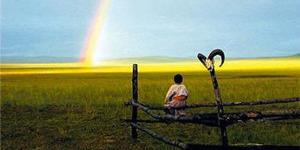
Mongolian Ping Pong is a warmhearted film about a nomadic family living in Nei Mongolia. The family is living a traditional lifestyle on the steppe while being introduced to glimpses of modernity of the 21st century. When Bilike, the seven-year-old son of the family, is asked to fetch water for his father from the local stream he finds a white ball floating in the water. He takes the ball and shows it to his grandmother. She claims it is a ‘glowing pearl’ and it brings good fortune. Throughout the film Bilikie is fascinated with the ball as he is unaware of what it actually is except an auspicious sign from the upstream river gods. When his father creates a makeshift antenna and connects it to an old television set outside of their ger, Bilikie learns that the white object is actually known as ‘the national ball’ and he is determined to return it to the nation. His understanding of ‘the nation’s capital’ is Beijing as he hears his grandmother sharing stories about Beijing as part of ancient folklore. Bilikie and his friend decide they will travel to Beijing on their horses without any pre-planning or awareness of how far Beijing is from their nomadic home in Nei Mongolia. This film has many takeaways for a high school audience. First, it shares remarkable views of the natural and cultural landscapes of the Inner Mongolian steppe and Gobi Desert. It also introduces the viewer to the lifestyle of nomads in the 21st century and the disconnect between urban and extreme rural cultural awareness. Bilikie is a seven-year-old child whose behavior represents a typical child from any region of the world. However, growing up in a family that is disconnected from modernity on the steppe shelters him from cultivating a sense of worldliness until the ping pong ball enters his life. At the end of the film Bilikie is sent to a village school and learns the real purpose of ‘the glowing pearl’ and his life is changed forever. The film forces the audience to pause and grapple with the extreme differences yet subtle similarities between Bilikie’s life on the steppe and the modern world.



